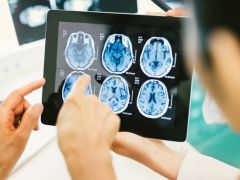World Brain Tumour Day 2022: As World Brain Tumour Day has approached, we discuss the theme and significance of this day. Along with this, we raise awareness towards the early signs, causes and treatment of brain tumours.

World Brain Tumour Day 2022: Brain tumours can cause frequent and prolonged headaches
World brain tumour day was initiated by the German brain tumour association on June 8th, 2000. Ever since June 8th is observed as World Brain Tumour Day to raise awareness and support patients and their families.
Significance & theme
The association aimed to provide assistance and pay tribute to the families affected by a brain tumour. The day spreads awareness regarding the symptoms, causes, and treatments. Different campaigns and discussions are held to discuss this issue. It highlights new research in the field of medicine and urges people to look out for warning signs.
The theme for World Brain Tumour Day 2022 is “ Together We Are Stronger”. This year the aim is to pay tribute to those whose loved ones have been diagnosed with a brain tumour.
While it can be difficult to see a loved one battle against a brain tumour or cancer, it is necessary to fully support their rehabilitation journey. An early diagnosis, family support and treatment can help beat a brain tumour. Look out for warning signs in your loved ones and urge them to get medical help immediately.
How does a brain tumour occur?
A brain tumour is an abnormal growth of cells in the brain. There are two types of brain tumours, malignant or cancerous tumours and benign or non-cancerous tumours. As the brain is the control centre of our body, brain tumours impact all body functions and can greatly disrupt your lifestyle.
There are two kinds of tumours primary tumours and secondary tumours. Primary brain tumours can occur in children or adults, although they are very rare. Secondary brain tumours occur when the body is already battling a different form of cancer that has metastasised.
What are the causes?
While the primary cause behind brain tumours is unknown. It is believed to be due to genetic mutations in cells leading to excess growth. The mutated cells grow and divide at a speed faster than healthier cells and also live longer, forming a mass of abnormal cells or a tumour.
Radiation
Exposure to ionising radiation can be a reason behind genetic mutation in cells. For people who have been previously exposed to radiation therapy for cancer or radiation from X-rays, CT scans might increase the chances of brain tumours.
Family history
People with a history of a brain tumour in the family are at a higher risk of developing the tumour.
Gender
Men have a higher chance of developing brain tumours than women.
Environment
Living or working near a nuclear power plant or being exposed to pesticides, nitrous oxides, and rubber can increase the risk of brain tumours.
Head injuries
There are chances of developing benign brain tumours after severe head trauma.
Nitros compounds
Nitrates found in substances such as cigarettes, cured meats or low-quality makeup products increase the risk of brain tumours amongst adults.
Poor lifestyle
Unhealthy lifestyles and habits can also cause or make your body more prone to developing cancer. As you may be aware, smoking can cause cancer. Furthermore, drinking regularly or substance abuse can make your body more prone to tumours and various other conditions.
What are the symptoms?
Dr Ashish Gupta, Director, Neurosurgery and Spine Fortis Escorts Hospital, Faridabad. suggests, “Early Diagnosis and recognizing the early symptoms of brain tumour is the key to better treatment outcomes. Patients are advised to recognize the early symptoms of the brain tumour and act immediately to consult a neurosurgeon.”
Starting treatment early can massively increase the chances of beating the tumour and completely recovering.
Look out for these symptoms:
- Constant headaches
- Feeling nauseous or vomiting without any significant reason
- Blurry vision
- State of confusion and disorientation
- Forgetting important details or memory loss
- Sudden dizziness
- Sudden mood swings
- Loss of hearing
- Losing motor skills, having trouble maintaining balance
How can a brain tumour be treated?
“Brain tumours, if diagnosed timely and at early stages can be treated safely” says Dr Ashish Gupta. “Modalities of disease investigation today help in achieving great precision in the diagnosis and hence the treatment outcomes for the benign and malignant tumours are improving gradually. With a mix of multidisciplinary approaches, advanced surgical techniques, radiotherapy and chemotherapy achieving positive results have become possible. As a result, patients should be aware of their health and take timely action towards getting their symptoms diagnosed.”
Hence, noticing early signs and seeking professional advice can pose very helpful. Besides this, we also encourage you to be mindful of the main causes behind developing a brain tumour.
Disclaimer: This content including advice provides generic information only. It is in no way a substitute for a qualified medical opinion. Always consult a specialist or your own doctor for more information. NDTV does not claim responsibility for this information.
DoctorNDTV is the one stop site for all your health needs providing the most credible health information, health news and tips with expert advice on healthy living, diet plans, informative videos etc. You can get the most relevant and accurate info you need about health problems like diabetes, cancer, pregnancy, HIV and AIDS, weight loss and many other lifestyle diseases. We have a panel of over 350 experts who help us develop content by giving their valuable inputs and bringing to us the latest in the world of healthcare.














